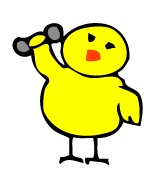 Well I guess it's time I give an update on the results from my sleep study. This follow-up appointment was so much different than any follow-up I've been to before. I went in there and the nurse practitioner went through my different sleep cycles and brain waves and limb movements... which all looked like the picture you see on the left. Those lines signify all the different hook-ups I talked about in the previous post.
Well I guess it's time I give an update on the results from my sleep study. This follow-up appointment was so much different than any follow-up I've been to before. I went in there and the nurse practitioner went through my different sleep cycles and brain waves and limb movements... which all looked like the picture you see on the left. Those lines signify all the different hook-ups I talked about in the previous post.So it ended up that out of the 8.4 hours they were doing the study (from lights off until lights on), I slept 4.8 hours of it. I only recall waking up for 1 prolonged period of time and that is where I was laying there thinking about how best to let the tech know I wanted to get up to pee. In the summary part of this long report they gave me, it says that I waked up 13 times/hr throughout the night, which obviously disrupts my sleep (normal is less than 5). They also wrote down here that my REM sleep is slightly low (that's why I don't have a lot of good dreams!), I have mild snoring when laying on my back (knew that...), and that I have rare bursts of periodic limb movements (about 3/hr). Very interesting... right? So, it says here I have chronic insomnia which pretty much just means that I don't have apnea or narcolepsy, or some reason like that that I can't sleep...
After she went through all that stuff with me, she started talking about different options I could choose to help with my sleep. This is the different part... I'm used to a doctor just writing me a prescription and calling it a day, but she gave me a whole bunch of things I can choose from, and kinda left it at that. I like this approach, because some people... like myself want to try to fix things without prescription drugs, and some people don't. Here are the options given to me, and if you have sleeping issues too, you should definitely try them.
-Cognitive Behavioral Therapy
-Light Therapy with a SunBox light box (http://www.sunbox.com)
-Melatonin (found at a health food store or a drugstore)
-Neurontin (prescription used for epilepsy, pain disorders, restless legs syndrome, and insomnia)
-Rozerem (prescription - has more drug interactions and side effects than neurontin, so they try neurontin first...)
-They also said that for chronic insomnia, they don't recommend Ambien or Lunesta because you gain tolerance to them and they're only used for the short term.
I decided to start with Melatonin because it seemed like the easiest for me. On the bottle, it says to take 30 minutes before you go to sleep, but the nurse practitioner told me to take it around the time the sun goes down (but since that's anywhere between 5pm and 9pm around here, she usually tells people around 7pm). Honestly, I have no idea if I'm still waking up those 13times/hr, but I feel like I've been sleeping a lot better so far on it. I've actually slept through the night a couple times in the past week or so, and that never happens to me. It definitely makes you feel sleepy after you've taken it, so if you want to go out on the weekend or something, I would delay the dose. Anyway, I'm pretty happy with it right now, and kind of feel like my body is trying to make up for the 10 years of sleep loss. I'm hoping the melatonin will be enough and I won't have to take a prescription drug.... but we'll see :). Let me know how any of the options work out for you if you try them!





